| BYD K9 (Gemilang) | |
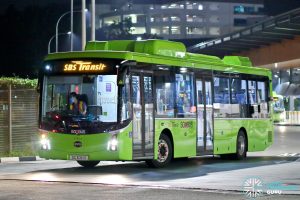 |
|
| Manufacturer | BYD Auto Industry |
| Bodywork | Gemilang Coachworks Sdn Bhd |
| Years in operation | 2020– |
| Operator | SBS Transit |
| Technical Data | |
| Length | 12 metre |
| Motor | AC synchronous motor (BYD-2912TZ-XY-A) |
| Battery | LiFePO4 (310kWh capacity) |
| Accessibility | Low floor |
| Emission Standard | Zero tailpipe emissions |
The BYD K9 (alternatively, the BYD electric bus or BYD ebus) is a fully electric, low-floor single-deck city bus manufactured by BYD in China. Well known for battery production and electric vehicles, BYD sells electric buses of different sizes for local and international markets.
20 units of the BYD K9 bus were procured by the Land Transport Authority in 2018 for S$17.25 million (inclusive of charging infrastructure) as part of efforts to build a more environmentally friendly public bus fleet. In total, 60 electric buses were procured from three separate manufacturers at a total sum of S$50.64 million. While primarily offered as an integral bus, these BYD K9 buses for Singapore were bodied by Gemilang Coachworks, based in Malaysia.
An initial 5 buses were registered to SBS Transit in January 2020. These buses first appeared on revenue service on 29 July 2020.
An additional 5 buses were registered to SBS Transit in October 2020.
A BYD K9 integral bus was previously trialed by Go-Ahead Singapore between 2016–2017.
Model Background
Bus operators in China are primary customers of the BYD K9, with units operating in multiple Chinese cities. In addition to strong success in the domestic market, similar BYD electric city buses have been successfully exported overseas, with large-volume orders entering service in cities across Europe, North America, South America and Asia, in addition to small-scale trials in many other regions.
The 12-metre BYD K9 bus incorporates large-capacity Lithium-Iron-Phosphate batteries which allow the bus to travel 250 km on a single charge, under urban road conditions. The actual operating range is expected to be much lower in Singapore, where air-conditioning consumes a large portion of battery reserves. On Singapore road trials, the bus is confined to duties within 200 km, leaving an adequate margin of safety.
The first BYD K9 rolled off the production line in Changsha, China on 30 September 2010. An initial 200 units were delivered to the Shenzhen public transit system to serve the 2011 Summer Universiade, and subsequently remained in regular service with the local bus system. BYD has since expanded its production to other parts of China as well as overseas.
Singapore Trial History
Main Article: Go-Ahead Singapore BYD Electric Bus Trial
First BYD K9 Trial (Click to expand) In April 2015, Singapore saw its first BYD K9 integral bus, which was brought in by HDT Singapore Holding (the Singapore agent of BYD Co. Ltd back then). This bus was parked inside Nanyang Technological University’s campus for several months (April to July 2015), and was later shipped to Jakarta for a while before returning. From November 2016 to May 2017, Go-Ahead Singapore trialled the bus (registered SG4001J) on revenue service to assess the suitability of e-buses for public transport. The eBus trial was part of an electric vehicle (EV) testbed led by LTA and the Economic Development Board to trial fleet-based EV operations. Charging equipment and infrastructure was installed at Go-Ahead‘s depot in Loyang. After the trial, the bus was returned to BYD Singapore Pte Ltd and was re-registered as PC6264K. As a private bus, it was also leased out to Tong Tar Transport Service Pte Ltd. As of July 2019, the bus was regularly sighted on the Downtown East Lunchtime Shuttle Bus. As an expansion of the trial, the Government later moved to procure 60 more electric buses as surfaced during the Committee of Supply Debate 2017. The BYD K9 chassis has also been offered with bodywork by Alexander Dennis and marketed as the Enviro200 EV. The bus has seen service in London, Liverpool and Auckland. Regions with volume orders of the BYD K9 include Ruhr (Germany), Copenhagen (Denmark), Eskilstuna (Sweeden), Amsterdam Schiphol Airport & Schiermonnikoog (Netherlands), Brussels Airport (Belgium), Beauvais (France), Milan, Turin, Novara & Padua (Italy), Madrid, Badalona & Badajoz (Spain), Warsaw (Poland), Haifa, Tel Aviv & Jerusalem (Israel), Alexandria (Egypt), Cape Town (South Africa), Anaheim & Los Angeles (USA), St. Albert (Canada), Santiago (Chile), Mendoza (Argentina), Guayaquil (Ecuador), Medellín (Columbia), Salgótarján (Hungary), Bangalore & New Delhi (India), Canberra, Sydney & Brisbane (Australia), Kaohsiung & other cities (Taiwan), Kyoto & Okinawa (Japan), Daejeon (South Korea), Kuala Lumpur (Malaysia), among other regions. Powered solely by electricity, the bus produces zero tailpipe emissions, which improves air quality in cities. Its batteries are environmentally-friendly, non-toxic and can be recycled. It also claims considerable savings in running costs as compared to regular diesel-powered buses. Find out more about Electric Buses in Singapore here. The BYD K9 for the Singapore market is built on the BYD D9A chassis (produced in Shenzhen, China) and bodied by Gemilang Coachworks in Malaysia. It is one of many electric vehicles offered by BYD. At the heart of the electric bus are its high-capacity Iron phosphate batteries, which store the energy needed to power the bus. A full charge provides sufficient energy for over 250 kilometres of usage—suitable for most urban bus routes. The bus is propelled by two wheel-hub motors, each driving one set of rear wheels (left and right)—thus not requiring a transverse rear axle, gearbox, driveshaft or differential componentry. The 20 BYD K9 buses will be registered in 2020 as SG3050Z – SG3069X. All units are based at Seletar Bus Depot, where ten 150 kW overnight charging systems (supplied by ABB) were installed. Up to two electric buses can be connected and charged sequentially while parked at the depot, enabling all 20 buses to be fully charged within 4.5 hours. An initial 5 buses were registered to SBS Transit on 21 January 2020 as SG3050Z, SG3060U, SG3061S, SG3062P and SG3069X. All five units commenced revenue service on Wednesday, 29 July 2020, with buses deployed on Service 135, 162/M and 807/A. Buses are bodied by Malaysian bodybuilder Gemilang Coachworks based in Senai, Malaysia. As with typical Gemilang city buses, the bus is built with a lightweight aluminium bus body structure, using aluminium extrusions and composite elements designed for ease of assembly. Gemilang Coachworks of Malaysia had previously bodied BYD K9 buses for the Hong Kong market, with 14 ordered by Transport International Holdings entering service in 2017 (10 units for Kowloon Motor Bus, and 4 units for Long Win Bus). In addition, it bodied 15 BYD K9 buses for Rapid Bus in Kuala Lumpur, deployed on the BRT Sunway Line, and lent its expertise towards the development of the Carbridge TORO electric bus, which is built on a BYD K9 chassis. All these buses were configured as low-entry buses, but the Singapore units are low-floor, albeit with a steep inclined aisle and raised rear row of seats. The BYD D9A chassis were initially spotted by Facebook page BusLanes in May 2019 at Hong Kong port, in transit from Shanghai (China) to Port Klang (Malaysia). [Link] The 20 BYD K9 buses are registered as SG3050Z – SG3069X. Registration commenced on 22 January 2020 and was completed on 13 November 2020. These buses are leased to the following operator: Revenue service commenced on Wednesday, 29 July 2020 with the deployment of these buses on: For the overnight charging of the BYD K9 buses, ten 150 kW overnight charging systems have been installed at Seletar Bus Depot, supplied by ABB. Up to two electric buses can be connected and charged sequentially while parked at the depot, enabling all 20 buses to be fully charged and ready to run through the day within 4.5 hours. According to ABB, smart charging solutions from ABB incorporate a future-proof and modular design, safe and reliable operation and remote service and data management, and will pave the way for greener, more sustainable public transportation in Singapore. The BYD K9 for the Singapore market is built on the BYD D9A chassis (produced in Shenzhen, China), bodied by Gemilang Coachworks (in Senai, Malaysia), and shipped to Singapore as a Complete Built-Up (CBU) vehicle. The bus is painted in LTA’s standardized Lush Green base livery with ‘Eco Bus | Zero Emissions, Cleaner Air’ decals on both sides. In addition, SG3060U is stickered with an advert promoting it as an electric bus. Other buses were progressively stickered in March 2022. Roof-mounted components are, from front to back, the battery packs, air-conditioning unit, and what appears to be the heat exchanger for the battery thermal management system. The Valeo REVO-E Global air-conditioning system is mounted in the middle. Typical for full-electric buses, the air-conditioning unit uses electrically-driven compressors, tapping on the bus’ high-voltage DC power supply (shared with traction motors) via its own set of inverters. Although the Valeo air-conditioning unit is capable of battery cooling, Singapore’s BYD K9 (Gemilang) units have opted for an independent cooling system, with the roof-mounted heat exchanger located behind the air-conditioning unit. This is likely to standardize the battery thermal management system across BYD buses and reduce unnecessary systems integration—the BYD C6 buses have similar roof-mounted heat exchangers. Apart from the roof, battery packs are also housed behind the driver’s cab, underneath rear seats, and at the rear end of the bus. The BYD K9 (Gemilang) is a low-floor bus with 28 permanent seats. Step-free access is offered from entry/exit doors until the last row of seats. The bus takes many interior elements from the MAN A22 and MAN A95 (Euro VI) buses, such as the materials and/or design of sidewall panels, flooring material, cabin lighting, air-conditioning vents, stanchion poles, hand grips and so forth. This reflects the commonality of Gemilang buses built to LTA specifications. Like most single-deck buses in Singapore, the BYD K9 buses are configured with two doors: an entrance door at the front, and an exit door in the middle. The entrance doors are conventional inward-swinging leaf doors, while the exit doors are sliding plug doors. They are supplied by Masats. With the front axle being fairly close to the front entrance door, no front wheelarch seats are offered. This is the first time that a single-deck bus model in Singapore did not offer any front wheelarch seats since the Scania K230UB (Euro IV Batch 1) introduced in 2007 (excluding SG4001J). The entrance door is no longer fitted with a centre pole as per older buses for the benefit of stroller boarding. The door movement area is indicated in yellow on the floor. The bus features two wheelchair bays, both located opposite the exit door. They each accommodate one passenger-in-wheelchair (PIW), and are equipped with USB charging ports. Foldable armrests and a stroller restraint system is provided for wheelchair users and the securing of prams respectively. Vogelsitze System 750/3 seats are supplied in Slate Blue, with priority seats in Maroon. Seven seats are designated as priority seats: three between the entry and exit doors, and four more that make up the first row of seats behind the exit door. The maroon colour theme extends to the wheelchair backrests, which are similar in design to those installed on MAN A22 and MAN A95 (Euro VI) buses. A single foldable seat is integrated with each backrest. Grab poles and overhead handgrips are located on both sides of the aisle. All seats also have handgrips to provide commuters with additional support. Like the Euro 6 MAN buses, these poles are made of brushed aluminium. Yellow bus stopping bell-pushes are located around the bus cabin, mounted to stanchion poles. Some stanchion poles have areas around the bell also coated in yellow to aid with visual identification. Emergency hammers are located on pillars in-between windows. The rear section of the bus sits four abreast in forward-facing and rear-facing seats. All seats are raised above the aisle to accommodate underfloor components such as the battery packs and motors. The aisle is also narrow and noticeably inclined, with Gemilang affixing a warning sticker on the floor, advising passengers to take note of the incline. The last row has five seats and is raised by two steps above the aisle.Other Configurations
Introduction
Basic Technical Specifications
Dimensions
Length: 12.00m | Width: 2.55m | Height 3.50m
Electric Motor
BYD-TYC90A Permanent Magnet Synchronous Motors (×2)
alternate name: BYD-2912TZ-XY-A
Continuous power/torque of 220 kW (110 kW × 2) / 800 Nm (400 Nm × 2)
Maximum power/torque of 300 kW (150 kW × 2) / 1100 Nm (550 Nm × 2)
Regenerative braking capabilities + Front and rear disc brakes
Battery
BYD Lithium Iron Phosphate battery (Capacity 310 kWh)
Depot charger: 150 kW overnight charging system (supplied by ABB)
Plug-in CCS2 socket charging capability
Bodywork
Gemilang Coachworks bodywork
‘EcoRange’ aluminium bus body
EDS
LECIP Electronic Display Sign
Orange LED Matrix; Mounted on Front, Left side and Rear
PIDS
LECIP OBC-VISION Passenger Information Display System
LED text displays, LCD display screens and interior speakers
Driver Assistance
TNT Surveillance T-Guard
– Forward collision warning system (T-FA Front Alert Camera)
– Side collision warning system (T-SA Side Alert Cameras)
– Anti-Fatigue system (T-DA Driver Alert Camera)
– T-SEEDS telematics system
Passenger Capacity
28 Seated + 52 Standing = 80 passengers
2 Wheelchair Bays
Standard Equipment
Battery Thermal Management System (BTMS)
Smart Monitoring and Diagnosing System (SMDS)
Low-voltage electricity management system with self-diagnosis
Fire suppression system in battery compartments
Additional Specifications
Masats door systems
Valeo REVO-E Global electric air-conditioning system (Spheros SC 600 controller)
Vogel Industrie System 750/3 seats
Hella Aglaia APS-R-PoE Automatic Passenger Counters (Entrance & Exit doors)
USB Charging Ports
Stroller Restraint SystemBodywork
Fleet
(Registered on 22 Jan 2020)
(Registered on 6 Oct 2020)
(Registered on 7 Oct 2020)
(Registered on 30 Oct 2020)
(Registered on 13 Nov 2020)Charging Infrastructure
Exterior
Interior
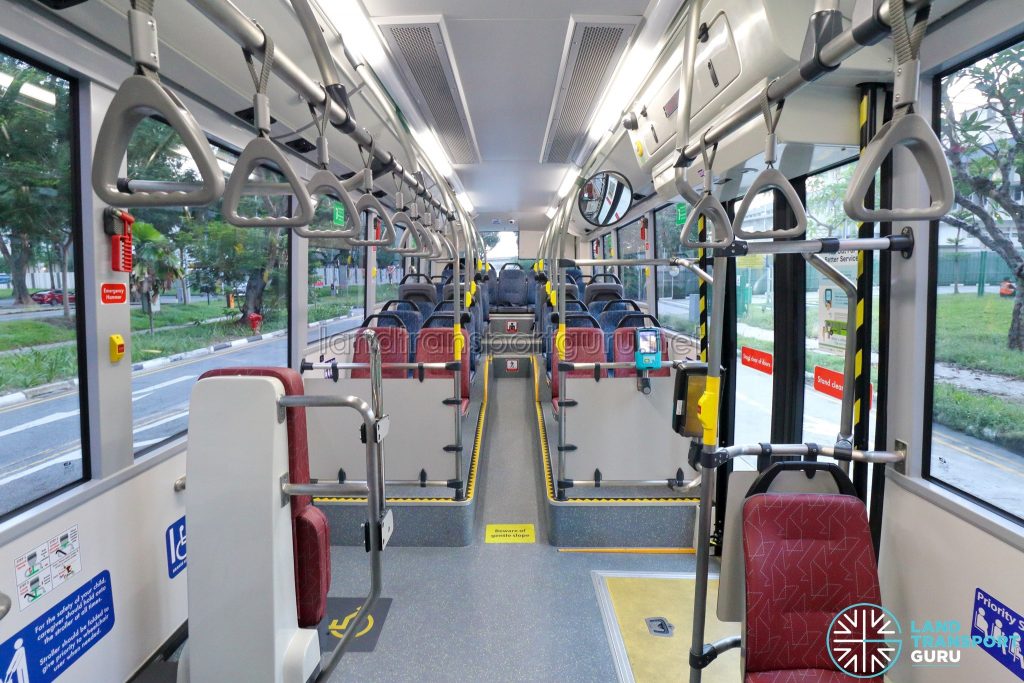
Seating
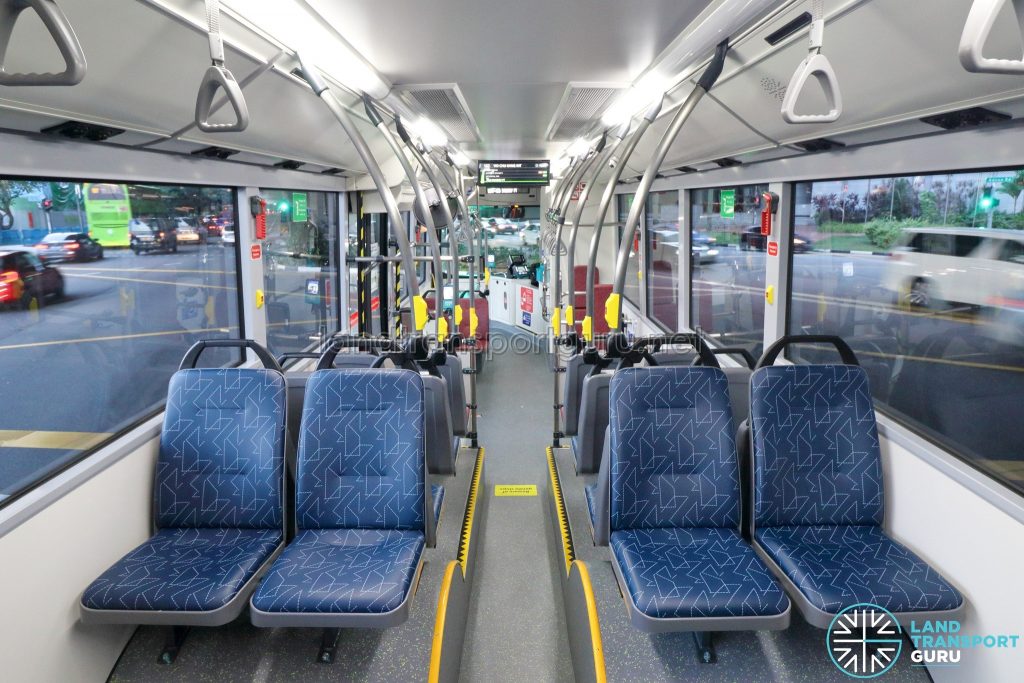
Continued on Page 2:
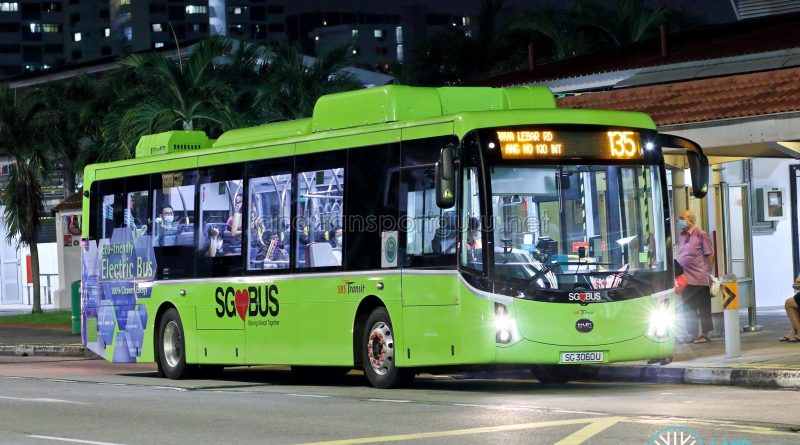
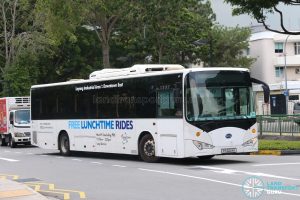
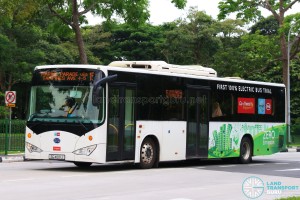
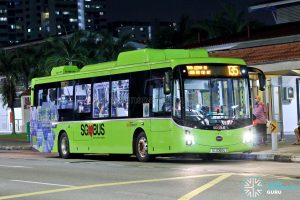
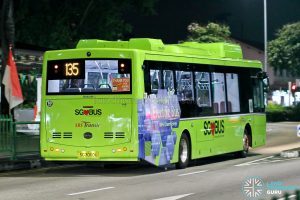
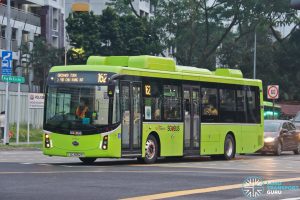
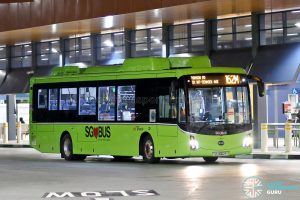
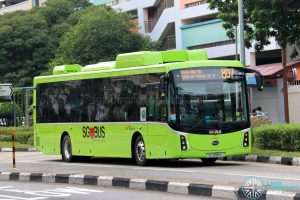
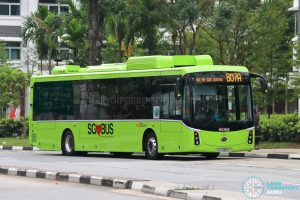
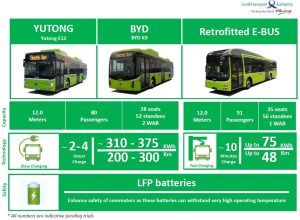
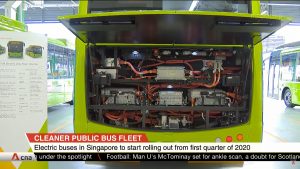
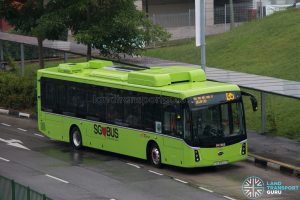
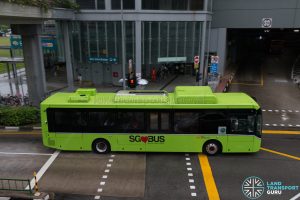
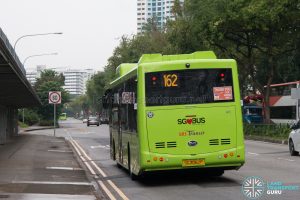
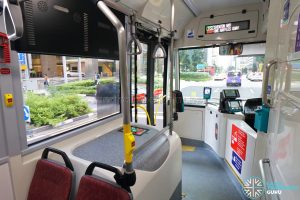
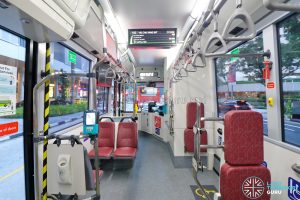
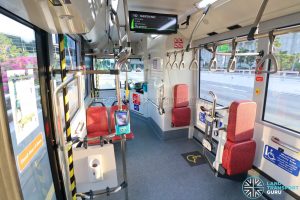
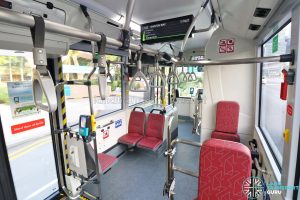
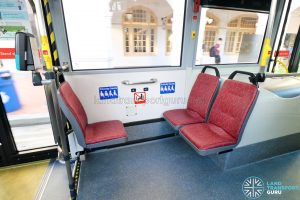
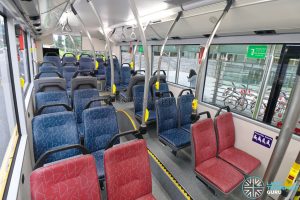
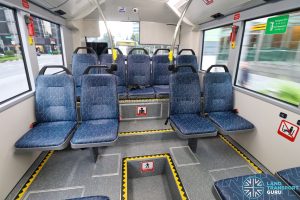
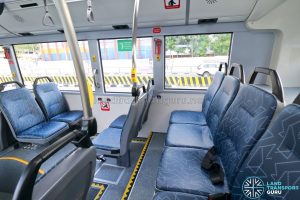
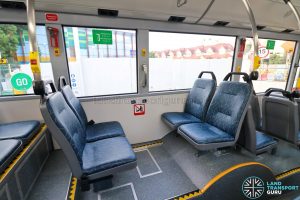
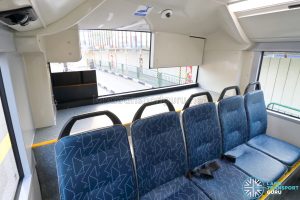
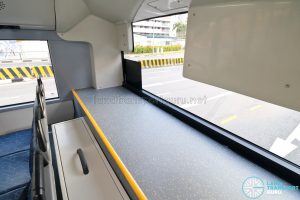
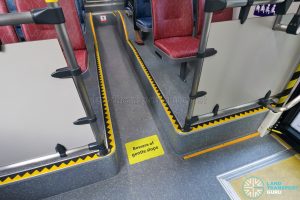
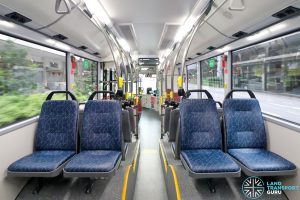
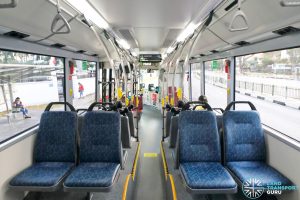
High chance all 20 units will go to SBST and deployed on SEDEP services.
Not sure
Hopefully would be service 803
5 units already assigned to SBS Transit SG3050,3060,3061,3062 & 3069.
135 162 807
The exterior of this model is nearly similar to the volvo B5LH. Also i hope i will see the electric buses soon!